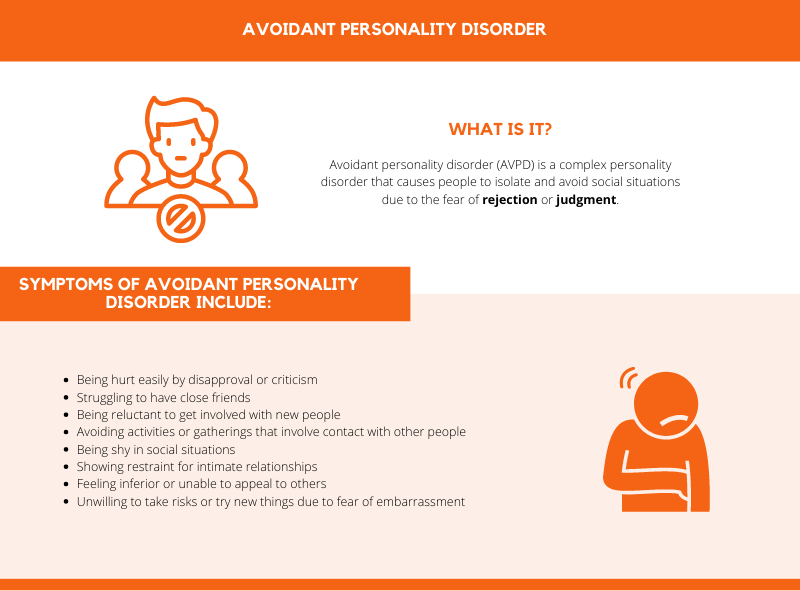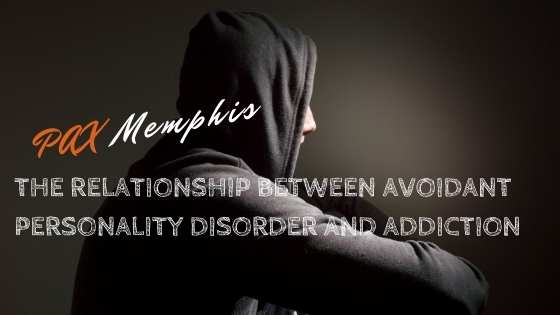Avoidant personality disorder (AVPD) is a complex personality disorder that causes people to isolate and avoid social situations due to the fear of rejection or judgment. Habitual isolation can significantly affect a person’s life because it can impair their social, academic, and occupational performance. This condition can also cause emotional and mental distress that is accompanied by depression and anxiety.
As a result of these troublesome symptoms, many people with avoidant personality disorder abuse drugs or alcohol to cope. Substance abuse can make a person feel more relaxed or comfortable either in social situations or while isolating at home, however, it can also worsen mental health symptoms in the long-run. On the other hand, some people who suffer from addiction develop AVPD later on in an attempt to hide their substance abuse from others as well as having little interest in social gatherings. Ultimately, there are several ways in which avoidant personality disorder and addiction are connected.
Signs and Symptoms of Avoidant Personality Disorder
Personality disorders are a group of disorders that are characterized by abnormal behaviors that are outside of cultural norms and that cause suffering to the individual or those around him or her. Avoidant personality disorder in particular is one that is distinctively marked by persistent feelings of fear, anxiety, and nervousness.

Symptoms of avoidant personality disorder include:
- Being hurt easily by disapproval or criticism
- Struggling to have close friends
- Being reluctant to get involved with new people
- Avoiding activities or gatherings that involve contact with other people
- Being shy in social situations
- Showing restraint for intimate relationships
- Feeling inferior or unable to appeal to others
- Unwilling to take risks or try new things due to fear of embarrassment
This condition is far more than just shyness. People with avoidant personality disorder may turn down job offers, avoid making new friends, and stay away from social gatherings altogether. While loneliness can be crippling, these individuals find it less painful than risking loss, judgment, or rejection among others.
It is estimated that approximately 2% of the population suffers from AVPD.[1]
Co-Occurring Avoidant Personality Disorder and Substance Abuse
AVPD is often comorbid with other mental health conditions, such as depression and substance use disorder. If a person with avoidant personality disorder repeatedly abuses drugs or alcohol to cope, they are likely to develop an addiction. Unfortunately, addiction itself is known as a disease of isolation, which is why substance abuse inevitably makes symptoms of avoidant personality disorder far worse.
There are many reasons why people with AVPD may begin relying on drugs and alcohol. First, some may use alcohol to loosen up and relax in social situations. Alcohol is known to decrease inhibitions and make socialization easier, however, using alcohol as a means of coping with AVPD is dangerous and can lead to addiction. Similarly, some people with this condition may use drugs before leaving their house to help them feel more comfortable when interacting with others.
In addition to using substances to interact with others, people with AVPD may abuse substances to cope with loneliness and fill their spare time. Since many of these people crave social interaction while feeling unable to attain it, they may find temporary solace through drugs or alcohol. On the contrary, people who suffer from addiction may begin to isolate themselves from their loved ones in an attempt to hide their addiction and stay away from people. This can lead to the development of co-occurring addiction and avoidant personality disorder as substance abuse continues to worsen mental health.
Avoidant Personality and Substance Abuse By The Numbers
While data is limited regarding the exact number of people who suffer from both avoidant personality disorder and addiction, researchers know that all personality disorders are often comorbid with drug or alcohol abuse.
Studies have found that up to 46% of patients with a substance use disorder also had a personality disorder. Among this 46%, 8% of patients had an avoidant personality disorder.[2]
Treatment for Avoidant Personality Disorder and Addiction
Treatment for AVPD is highly effective, however, it can be difficult to convince someone to go to rehab and get help. Since therapy is a social activity, many are reluctant to the thought of speaking with a therapist. When someone is struggling with both AVPD and addiction, it can be even more difficult to get help. Sometimes, an intervention may be necessary.
Treatment for co-occurring substance abuse and avoidant personality disorder relies on a healthy and trusting relationship between therapist and patient. Once trust is developed, the patient can begin learning how to manage their self-deprecating thoughts effectively so they can engage in social gatherings successfully.
These conditions are best treated in a dual diagnosis treatment setting. Dual diagnosis is a method where mental, behavioral, and substance use issues are addressed and treated simultaneously. For example, behavioral therapy, peer support groups, and coping skills can be applied to the treatment for both avoidant personality disorder and drug or alcohol addiction.
Dual diagnosis treatment specific to AVPD and substance abuse consists of the following:[3]
- Medical detox to deal with withdrawal symptoms and early sobriety
- Forming a bond between patient and therapist
- Making the patient aware of their thought processes and emotions
- Making the patient aware of emotional triggers and maladaptive behaviors
- Helping patients realize the connection between their emotions, thoughts, behaviors, and substance abuse
- Introducing coping skills and helpful tools
- Promoting the use of these coping skills and resources for recovery
Recovery from co-occurring disorders doesn’t happen overnight and treatment is often a long-term process, however, the results are well worth it.
Find Help Today
If you or someone you know may be struggling with avoidant personality disorder and drug addiction, know that help is available. At PAX Memphis, our licensed mental health practitioners are qualified to treat co-occurring mental health and substance use issues. To take the first step towards recovery, call us today to see how we can help you.
References:
Medically Reviewed: September 25, 2019

All of the information on this page has been reviewed and verified by a certified addiction professional.










